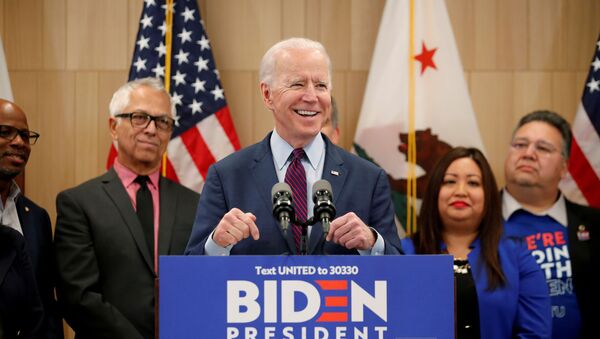A new CNN poll released on Monday indicated that Donald Trump stands 14 points behind Democratic presumptive nominee Joe Biden in the race for the White House, while the incumbent president's approval rating has plummeted 7 points in the last month.
The Trump campaign demanded that CNN retract "a stunt and a phony poll" conducted amid the nationwide protests; however, the media outlet responded that it stands by the survey figures. Earlier, election forecaster Sabato's Crystal Ball found that Biden had gained a substantial advantage over Donald Trump in 13 key swing states.
'Much Can Happen Between Now & Election Day'
"I think the key thing to keep in mind is that it is still very early for using polls for making predictions of the outcome of the 2020 election, and especially so given both the turmoil of this year and how Trump is such an anomaly in terms of presidential approval", says James Melcher, a political scientist at the University of Maine at Farmington, in Farmington, Maine.
According to him, much can happen between now and election day, in this volatile year especially.
However, judging from the models political scientists have traditionally used to predict the outcome of presidential elections, there are two variables which play a crucial role, namely, popularity and the state of the economy, the academic observes.
"Usually, when people perceive that the economy is doing well, their approval of the president is very high", he notes. "But Trump's numbers began unusually low for a new president and have tended to stay relatively low compared to the performance of the economy".
Given this, it appears that if there is not a substantial recovery of the economy by November and people largely blame Trump for that – based on his response to the pandemic for example – he is "probably finished", according to Melcher. "I think he is in more trouble for re-election than an incumbent running for re-election normally is at this point", he opines.
Will Biden Manage to Mobilise the Democratic Base?
One might wonder as to why Biden is gaining momentum even though at the beginning of his presidential campaign he was largely outpaced by progressives like Bernie Sanders and Elizabeth Warren.
Indeed, the academic admits that some express doubts whether the former vice president can mobilise the Democratic base. "I think he can because of their intense dislike of Trump", Melcher underscores.
"For people who do not like Trump, Biden is the opposite pole: calm, cheerful, steady and experienced in government", he explains. "He's a steady hand at the wheel at a time when many Americans crave that. People see him as a likeable, good guy for the most part (with an exception among those that he has been 'too handsy' around women)… Even a lot of voters that are not excited by Biden will back him in order to get rid of Trump".
Addressing previous concerns that Sanders' base may not throw their weight behind Biden, the academic is sure that Bernie's followers will support the former vice president for one simple reason – they will be "enthusiastically voting" against the incumbent president.
At the same time, Biden's "strongest core of support is with African-American voters", he continues.
"Most black voters, particularly older ones, are relatively pragmatic – feeling they can't afford a Trump continuation, and wanted someone they thought could win the election against Trump – that unlike some purists on the party left, victory is more important than ideological purity", the academic underscores, adding that Biden's close relationship with Obama has also impressed some black voters "because of his willingness to work for and be loyal to an African-American boss".
In short, Biden has emerged as probably the most broadly acceptable candidate that the Democrats could have nominated, according to Melcher.
What Choice Will Battleground States Make?
Meanwhile, polls show that the former vice president is doing surprisingly well in 13 crucial swing states. According to The Hill, Ohio has unexpectedly become a 2020 battleground, although Trump won the state in 2016 by eight points. However, as a Fox News survey found last week, Biden is now leading the incumbent president by 2 points in the state.
"Ohio is particularly key for Republicans", explains Melcher. "Going back to the first presidential election with a Republican, 1856, no Republican has ever been elected without carrying Ohio… It is one of the most conservative of the states that are in play, and it has a good chunk of electoral votes. When Republicans lose Ohio, it is often a sign that they are not running well in other places".
Nevada and Minnesota also appear to be would-be battlegrounds: these states were lost by Trump relatively narrowly in 2016 and Biden cannot take either for granted, according to the academic.
"Much of the key to Democratic victory is better mobilisation of black voters", he believes. "I would say the trends on the political climate point to an energised African-American electorate that will help Democrats… Black turnout will be crucial for Biden in nearly all of the states we're talking about. Michigan and Pennsylvania are especially cases of this, but North Carolina, Wisconsin, Florida and others, too".
At the same time, he deems that "the election comes down heavily" to Michigan, Pennsylvania, and Wisconsin, all of which Trump won very narrowly in 2016. Although conservative anger at the Democratic governors of all three states, especially in Michigan, over the handling of the coronavirus could also play a role in the upcoming vote, the academic is hesitant to make a prediction for any state.
"We could easily have a scenario again where Trump loses the popular vote – by an even bigger margin this time – and still wins the election", he concludes.





